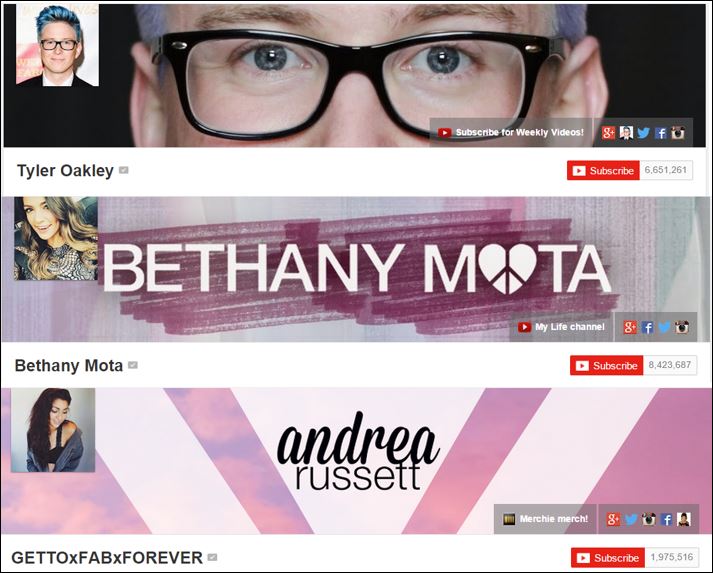
I recently had the opportunity to meet three of YouTube’s biggest stars — Tyler Oakley, Bethany Mota, and Andrea Russett.
Although barely out of their teens, this trio has millions of followers, contracts with mega brands, and huge amounts of money pouring in.
And I also found them to be incredibly down to earth and especially wise when it came to focusing on the core of their brand-building success — intimate connection with fans on a massive scale. Here are five lessons from some of the biggest online influencers on the planet:
1. Above all, be congruent.
Mota: “I have a deal with Aeropostale, both as a spokesperson and I am designing my own line of clothes … but they don’t make me wear their clothes all of the time. They know I wouldn’t normally do that. And if I did, my fans would be mad because they know that is not what I would do. That is not authentic.
“Let the bloopers stay in the video. Who wants to watch somebody who is always perfect? Be human. My fans expect it. I mess up all the time. Being imperfect is normal on YouTube.”
Oakley: “I have had good experiences with brands and I have had very, very bad experiences with brands. When brands start telling me what to do and what to say, I have to wonder, do they believe in me and my content, or do they really want to just use me for my numbers?
“People on YouTube are OK with looking like idiots. Big companies hate that. They want to run everything by the lawyers. It’s a disconnect.”
Russett: “If you follow trends, people will call you out. You have to know who you are and stay centered there.”
2. The foundation of an audience is trust
Oakley: “When a fan trusts me, I have a life-long supporter. For that to happen, I need to meet them, see them, go to places where they would not normally see me. People work on having me come to their town, and then they are more likely they will show up. I don’t want to ever disappoint them.”
Mota: “I still do all my own video editing. Yes, it is time-consuming but I don’t feel like I can give that up. My videos are me, they reflect my quirkiness and randomness. If my videos came across as too polished, my fans would know it wasn’t me any more. Today with our content, we have the opportunity to be part of people’s lives every day. You can’t take that for granted. You can’t let people down.”
Russett: “Taylor Swift is the best at this. She is a genius and a role model. She is the biggest star in the world and she still spends time listening to her fans, connecting to them and sharing her love with them. That’s what makes her a legend.”
3. Stay centered in the frenzy
Oakley: “I think there was a fear among a lot of people that working with a brand is selling out. No, young people understand that influencers need to make money. On the documentary Generation Like, young people didn’t even know what the word “selling out” meant. People are like, “You go!” If they love me, they are happy for me to succeed.”
Russett: “I don’t read my comments on my videos. I don’t want to see the negative stuff. As long as I’m happy with my content, that’s what matters.”
4. It takes a lot of work
Mota: “I work all the time. All the time. I keep thinking about taking a break but every new opportunity is also a lot of fun. So I say yes to the fun and keep going.”
Oakley: “The work builds and builds and builds. I didn’t just end up doing interviews on the red carpet at the Grammys. There were thousands of little steps along the way. I am addicted to the work and I am always pushing myself to do more. Why not do a tweeting session at 3 am? It would be good to connect with people in India!”
5. Focus on something bigger than the brand
Mota: “I had no clue I would achieve this. I was bullied online when I was 12. Then I started watching YouTube videos and I just loved this self-expression, at a time when I thought nobody saw me or cared about what I thought. But when I publish, I could see that people cared for me and I cared for them. It’s a positive place and now I can encourage people to open up about things like bullying. I have a YouTube channel where we build each other up.”
Oakley: “YouTube is a place where we can feel less alone even in a crisis. Now with my reach, I raised half a million dollars on my birthday to aid a crisis intervention center. This is a place I where I wanted to work one day and now I am helping them in other amazing ways.”
Bonus content: Here’s an interview with Andrea Russett:


